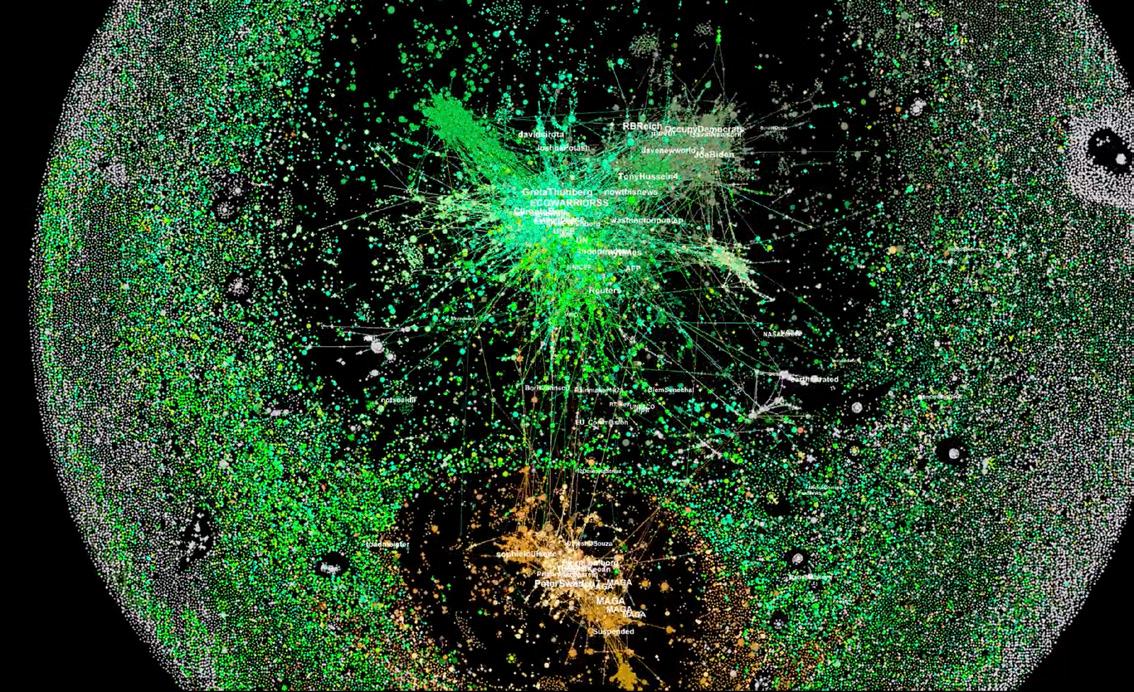Sowing doubt to slow down environmental action

The latest report of the Intergovernmental Panel on Climate Change (IPCC) makes the alarming observation that climate misinformation constitutes a major obstacle to effective decision-making. A complex and vast phenomenon, that beyond national borders, undermining the cooperative efforts between countries to tackle global challenges. Thus, insidious forces are hindering the battle against climate change : the scientific disinformation orchestrated by economical and political interests and its corollary, the worrying rise in polarised opinion.
In a world marked by the proliferation of information sources, science faces daunting challenges. Traditionally the guardian of truth, of reasoning backed up by tangible evidence, it comes up against numerous obstacles when it challenges established models or affects vested interests. Often criticised, distorted or corrupted, it is now under attack on an unprecedented scale in the open world of social networks.
An “alternative” science
At the end of last November, an investigation by the NGO Transport & Environment (T&E) revealed the inner workings of the Concawe research group (Conservation of Clean Air and Water in Europe). Behind this name, which seems to harbour quite laudable ambitions, is in fact the scientific unit of the European association of fuel manufacturers, Fuels Europe. According to T&E, their aim is to minimise European laws on protection against the risk of cancer from fuel fumes and road traffic pollution, by publishing scientific studies that oppose scientific consensus. Concawe has resources to match the economic stakes: an annual budget of 16 million euros, 18 scientists or external consultants... and an avalanche of documents : more than 200 studies have been published. According to these studies, the fatal risks associated with exposure to NO2 are unconfirmed, and the exposure of certain workers to benzene is negligible below certain upper limits... The idea is to instill doubt through scientific discourse, and in particular among European decision-makers through intense lobbying. The strategy has paid off, since the recommendations of the European Chemicals Agency (ECHA) to lower the authorised exposure thresholds for benzene from 2024 have not been adopted.
This manœuvre is not new. Be it benzene, neonicotinoids, glyphosate... there are plenty of studies financed by lobbies that try to call into question already established independent scientific studies and thereby hide crucial information from the public. The idea? Throw up a pseudo- scientific smokescreen, sow doubt and, above all, buy time to maintain the regulatory status quo for as long as possible. An alternative science to produce "alternative facts"... This is called disinformation, the deliberate creation of strategic ignorance.
Science under influence
Following greenwashing, there is now science washing: the overuse of the scientific arguments in order to create the image of a sustainable company, or worse misuse of scientific resources and findings. According to a 2023 study of Greenpeace, TotalEnergies has become a subtle champion in this practice. The multinational firm has slowly but surely infiltrated the scientific research, restoring its image and transforming key institutions into compliant partners. Out of the 103 research structures analysed in France, 55% had direct links with the company, revealing a disturbing grip on the country's scientific landscape. This worrying infiltration is exacerbated by the decline in public funding for research, allowing private companies to take over the field. While private funding is not intrinsically problematic, it is imperative to establish strict safeguards to prevent industrialists from exerting undue influence on the governance and direction of research programmes.
The University of Pau is becoming an emblematic case of this stranglehold. Between 20% and 30% of its funding comes from TotalEnergies, calling into question its independence and its public service mission. This takeover of public research by private interests, particularly in the fields of fossil fuels and carbon capture, underlines the urgent need to regulate this drift. There is no question here of creating fake studies, but rather of directing research towards fields that are less problematic for the company: a diversionary strategy. TotalEnergies, with its colossal budget of 1.1 billion dollars a year, is exercising a stranglehold on science that is seriously jeopardising the energy transition by diverting research from certain crucial solutions to technological solutions that do not call into question our carbon model. The enlightening statements made by philosopher of science, Mathias Girel, highlight the distorting nature of this practice, where rather than directly influencing researchers, companies systematically fund research topics that are favourable to their interests. This distortion of the advancement of knowledge constitutes a macro funding bias that shapes research to suit corporate agendas, thereby compromising the integrity of the discipline. Science is certainly progressing, but in what direction ? The many subjects neglected due to lack of funding are the vast terrain of our ignorance.
The scientific community itself has reacted vigorously to this collusion between the fossil fuel industry and academic institutions. More than 800 researchers and academics under the banner "Fossil Free Research" have signed an open letter denouncing this collaboration and highlighting the serious conflict of interest that threatens the credibility of research. Their call for action underlines the urgent need to put in place regulatory mechanisms to preserve the integrity and objectivity of scientific research.
Creating a community of sceptics
Orienting science, misinforming... the operation is only half successful if the message is not widely disseminated. While the aim is certainly to confuse decision-makers, it is much more ambitious: to sow doubt and ignorance on a large scale. And to achieve that, you need to create the illusion of widespread support for an opinion.
This is what David Chavalarias, Director of Research at the CNRS Institute for Complex Systems and author of "Toxic data", has set out to decipher. He is studying interactions on social networks and the manipulation of public opinion through the circulation of disinformation. His work highlights the mechanisms by which climatoskeptic thinking is propagated. Each time an IPCC report is published, he observes counter-offensives spreading anti- climate messages that discredit scientific conclusions. These tactics, orchestrated via social networks, aim to sow confusion and discredit the message of climate urgency. This engineering of disinformation on social networks takes advantage of the ease with which information can be shared. It is generally disseminated by a small, overactive community, without which the networks would have no voice at all in the face of the near-consensus on the subject. Among them is the Heartland Institute, a conservative and libertarian American think tank known for its rejection of the scientific consensus on climate change, historically funded by the oil industry and whose funding is now non-transparent.
In his recent study "The new fronts of denialism and climate scepticism: two years of Twitter exchanges under the microscope", David Chavalarias identifies the low level of expertise of the senders of supposedly scientific climate sceptic messages. "The denialist community presents inauthentic forms of expertise, with a hard core of accounts that express themselves on a multitude of subjects, concentrate presumed expertise and fabricate the majority of narratives in circulation". Fake scientists, but also fake accounts, are present on the web to create the illusion of a widely sharedopinion. The researcher points the finger at astroturfing practices that are widespread in the climate sceptic camp. These are defined as unfair propaganda and manipulation practices, particularly on the Internet, designed to give the impression of a spontaneous mass phenomenon when in reality it has been created from scratch to influence public opinion. The climate sceptic community has an over- representation of accounts with inauthentic behaviour ("probably bot" accounts) of +71% compared with pro-climate communities (6%). "This strategy is currently enjoying renewed interest with the arrival of conversational artificial intelligences such as ChatGPT, which reduce the costs of this type of operation while increasing its effectiveness," adds David Chavalarias. The digital landscape is therefore not representative of the state of opinion on this subject, but these practices add to the illusion of a widely shared alternative way of thinking. Welcome to the realm of fake.

The global debate on climate change on Twitter/X is strongly bipolarised, with around 30 % climate-denialists.
These artificially inflated filter bubbles are self-sustaining and radicalised by algorithms that only suggest what Internet users like. Erroneous content circulates on average six times more than other messages. Here we find the wildest and most unscientific ideas. In particular, there is a definite appetite for conspiracy theories.
Carlos Moreno, pioneer of "the 15-minute city" project, paid the price. His idea was a simple one : to make all aspects of urban life accessible within a short walk or cycle ride, promoting ecology, proximity, solidarity and participation. Unfortunately, this innovative vision unleashed a storm on social networks, exposing Moreno and other scientists to death threats. On digital platforms, the 15-minute city is vilified as a socialist plot and seen as a threat to individual freedom. Some detractors, often climate sceptics, see it as a pretext for greater control via digital identity and an attack on the freedom of car ownership. Fictitious links with Covid-19 confinements are also put forward, suggesting preparation for so-called 'climate confinement'. The 15-minute city became a shining example of how the spread of false information online can threaten innovative ideas aimed at improving our cities and our daily lives... thus, undermining climate action.
So, social networks are not simply passive witnesses to polarisation, but active agents in the formation and dissemination of divergent opinions on climate change. This underlines the importance of raising public awareness of misinformation tactics and promoting media education to encourage an informed and balanced understanding of climate issues. Al Gore and his concept of "inconvenient truths" remain undeniably relevant in the current context. This expression was used fifteen years ago by the former White House candidate to highlight the uncomfortable nature of the realities we face in relation to climate change. It has a powerful resonance today when we consider the scale of the disinformation campaigns, the tactics deployed to sow doubt and delay the collective action that is needed.

